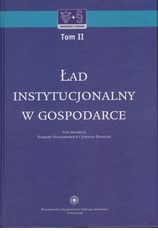NIEZALEŻNOŚĆ BANKÓW CENTRALNYCH PAŃSTW KANDYDUJĄCYCH DO CZŁONKOSTWA W UNII EUROPEJSKIEJ
THE INDEPENDENCE OF CENTRAL BANKS IN THE CANDIDATE STATES FOR THE EUROPEAN UNION MEMBERSHIP
Author(s): Przemysław PanfilSubject(s): Business Economy / Management, Economic policy, Transformation Period (1990 - 2010), EU-Approach / EU-Accession / EU-Development, EU-Legislation
Published by: Wydawnictwo Naukowe Uniwersytetu Mikołaja Kopernika
Keywords: Central Banks; Independence; European Union; EU law; Economic and Monetary Union;
Summary/Abstract: Since the enlargement of the European Union by ten new Member States on 1 May 2004, there have remained four candidate countries: Bulgaria, Romania, Croatia and Turkey. In order to join the Union, they need to fulfil economical and political conditions known as the Copenhagen criteria. Especially, the candidate States must adopt common rules, standards, and policies that make up the body of the European Union law. European Union legislation on Economic and Monetary Union (EMU) contains specific rules requiring the independence of central banks in Member States and prohibiting direct financing of public sector by central banks. These rules must have been implemented by the date of accession. Bulgaria, Romania and Croatia have taken major steps forward and have achieved a high level of alignment with the EMU-related acquis. However, some aspects of legislation on central bank independence need to be further corrected. Turkey’s overall alignment concerning the EMU acquis is limited. The independence of the central bank should be further strengthened, particularly on the determination of the inflation target and in the area of personal and institutional independence.
Journal: Ekonomia i Prawo. Economics and Law
- Issue Year: 2/2006
- Issue No: 1
- Page Range: 273-288
- Page Count: 16
- Language: Polish

